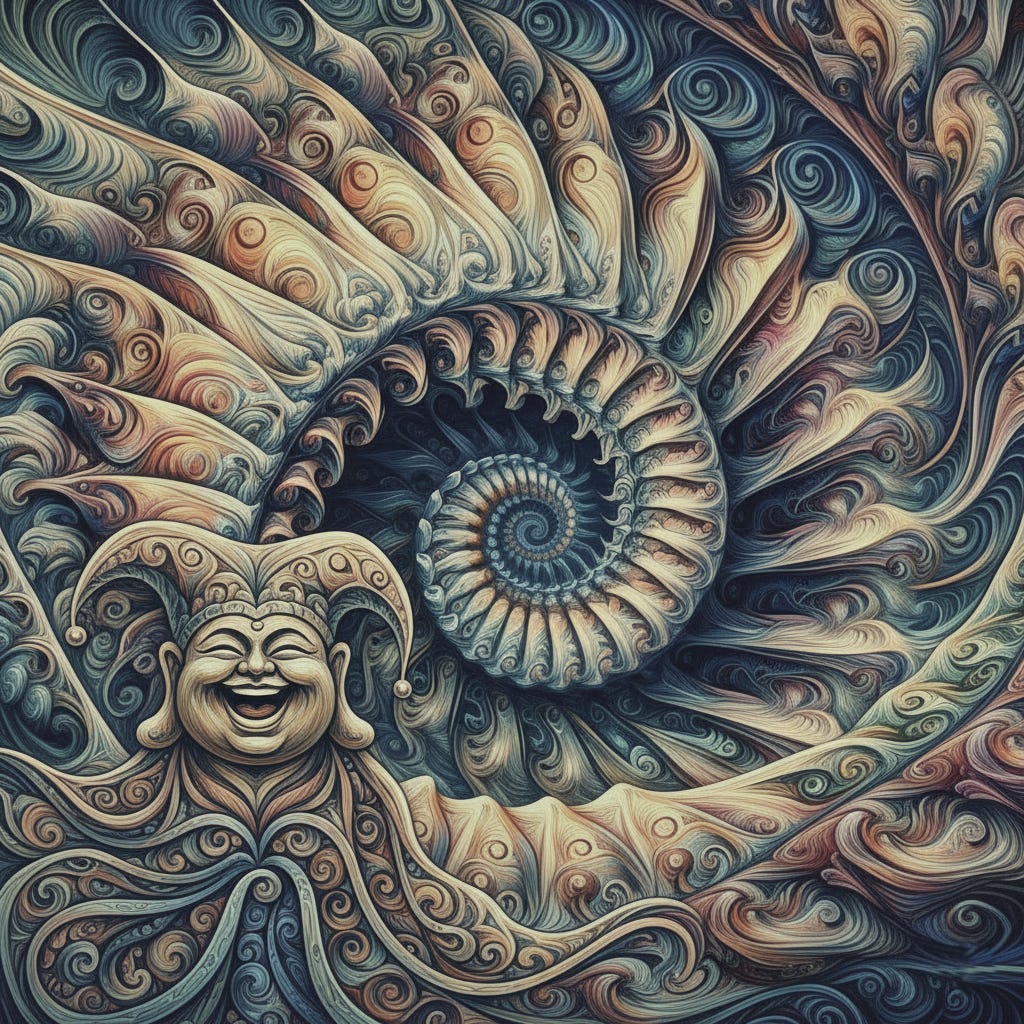Freedom is not a feeling, nor a state of being. To be existentially unconstrained cannot be associated with any particular inner or outer context since, to be absolute, such a non-contingent abiding must comfortably be able to contain any and all states that may arise. Nevertheless, one might recognize it when one tastes it: There’s breathing, there’s colour, there’s feeling, there’s care, there’s receptivity, there’s specificity, there’s possibility. In that recognition though, the mind might easily play a little trick on itself and believe, “it’s mine now; freedom is… like so.” In this way, recognition of immediate experience slips stealthily into idea and identification. And, just like that, one is now high on the Dharma, and heading for yet another confused crash.
Ever since I’ve been interested in such things I’ve regularly seen this and similar patterns play themselves out for me. It’s a subtle and easy mistake to make. I’ve even found myself getting high off of reading warnings about the trap itself. How can one wrap one’s head around a goal that cannot be personally attained, whilst its fringes continue to flaunt and tease themselves into one’s experience. The recognition can sometimes feel giddy: Kaleidoscopic viewing, inside and outside. All of a sudden, perhaps there’s a rush, and the dream self-elaborates: Without intending or realizing, one is now clinging to a chanced glimpse of what has already passed.
“Getting high” is not just hyperbole. My experience of getting high on various intoxicants matches my experience of the high of this variety of grandiose ideation in many key ways. One might posit, “well, getting high on drugs is artificial and bad for you, but if you’re feeling high due to something like meditation and contemplation, at least that’s much healthier.” I’m not so sure this is always right. For chemical intoxicants, at least there’s a clear cultural recognition of one’s faculties being impaired while under the influence. “Oh, that was embarrassing but, hey, I was drunk.” One can readily admit that one was momentarily delusional due to chemical impairment. Whereas, in life practice, one has an idea that they are doing (or at least wish to be doing) something good for themselves and even for others: Something to help see more clearly, not less. Then, if one has moments of seeing some tantalizing results, attaching to and identifying with the associated pattern of states, and then experiencing the inevitable eventual dissolution of such pattern, one might not so easily recognize that, “oh, I was just high on the Dharma.”
In some ways getting high on an idea is no different from many other forms of neurotic stuckness. A prolonged depressive state might also have its origin in an uncomfortable idea that is attached to, stretching its tentative validity well past its natural lifetime: distorting a temporary feeling and its associated beliefs into a seemingly timeless well of hopeless truth. Then again, depressive states usually possess so little energy that their dying embers can remain subtly glowing in near stillness for tortured eons. In contrast, being high on a lofty idea has the roaring energy of a brightly burning torch, and at least has the virtue that it will burn itself to completion soon enough. Reality stands at the ready to slap you into sobriety, no matter that you’re buck naked and everyone is watching.
What is that supernatural slap so effortlessly slapping away? What delusions sneak along with my natural high? The delusion that I might embody only my preferred ways of showing up in the world. That I have independent control: over myself, my feelings, my relationships, my environment. That it can all be explained; that there’s some absolute sense that can wrap around life like a bow; that I can have that wisdom. That feeling good is a sure sign of being good, and that it might hardly end. That my vitality and thriving have anything at all to do with my preferences. That something inside of me can be fundamentally validated by something outside of me. That inner is separable from outer. That care is separable from heartbreak. That any life can be lived substantially free of whatever disturbance.
That dreaded slap: Embarrassing, awkward, angry, jealous, resentful, fearful, hopeless… anxious. That slap is interesting. It’s intense. It’s not what you want. But empires will rise and crumble, loved ones will pass away, and babies will spring into being. The only thing one can count on is that something will fade and something will arise, and so it’s well worth lingering right there where the discomfort that reflects such change finds one standing. If there is vastness to be discovered, it must be in that slapping (and in the preceding highness for that matter) as much as it is in anything else. Ironically, perhaps the clinging that fuels the slap is itself a reaction to the unconscious recognition that the state of bliss will end sooner or later: a sort of preemptive protest against the foreshadowed anxiety.
What if the appearance of anxiety was no longer feared as a problem to be avoided, but experienced instead as a window, opening our bodies into the unbounded potential inherent in this new moment? What then would highness and lowness be like without clinging; if there was nothing to avoid; if all delusions were seen through? Or is the question itself just another misframing? Another wishful attempt at sidestepping uncertainty… Nevertheless cradled with wonder in the continuing expanse of awareness.



